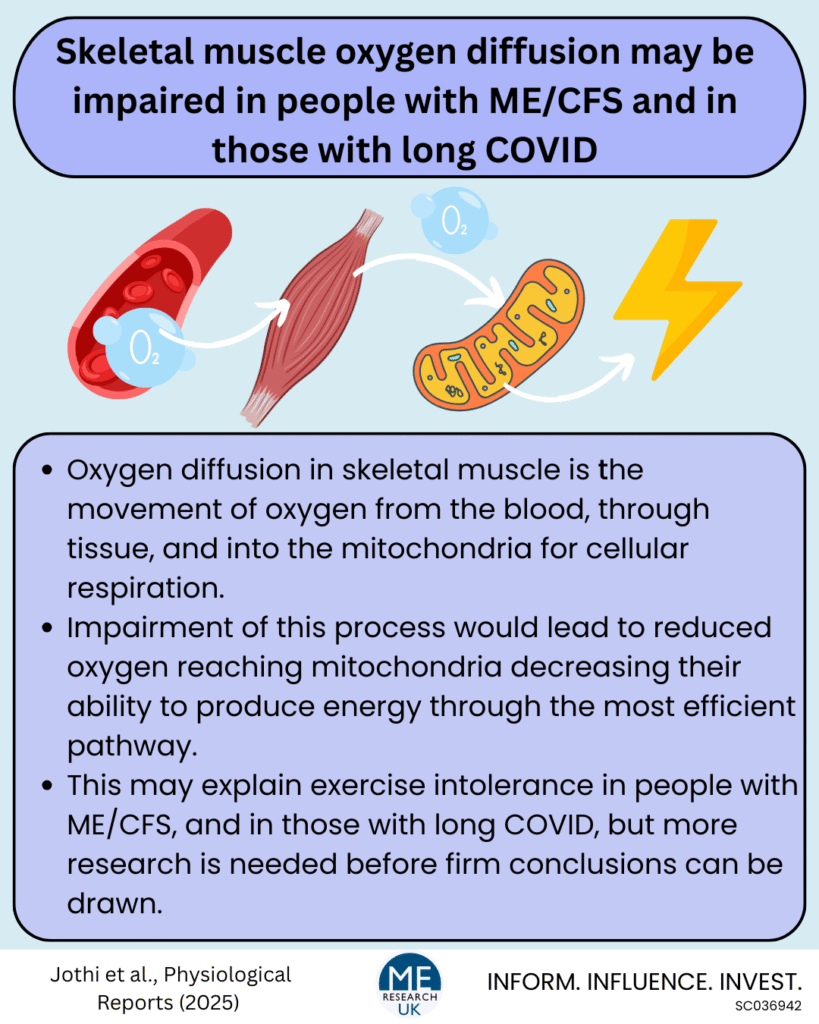A small exploratory study has identified that skeletal muscle oxygen diffusion – an important process in the body which ensures the delivery of oxygen to muscle cells for energy production – may be impaired in both people with ME/CFS and in those with long COVID.
The research team recruited 37 people: 11 meeting the IoM criteria for ME/CFS, 15 meeting the WHO definition for long COVID, and 11 healthy controls. Importantly, information for those with ME/CFS was collected before March 2020 meaning that these participants “had not been infected with SARS-CoV-2 at the time of assessment”.
All participants gave their informed consent before undergoing a type of exercise testing called “invasive cardiopulmonary exercise testing (CPET)”. Invasive CPET provides highly detailed measurements of blood pressure, information on blood gases, and allows the calculation of the volume of blood pumped by the heart per minute (cardiac output) during exercise.
Interestingly, in their paper the researchers state that results from less detailed non-invasive CPET have shown that there appear to be differences between people with ME/CFS and healthy controls during exercise. In this new study, invasive CPET – which the authors say has rarely been used in ME/CFS research – allowed a more thorough investigation, something which is essential to gain a better understanding of disease mechanisms.
Results showed that although measurements at rest were very similar for the three groups, during exercise the maximum amount of oxygen that the body used during exercise (peak oxygen consumption) was reduced for people with ME/CFS, and for those with long COVID. Importantly, skeletal muscle oxygen diffusion was the most impaired parameter considered.
The researchers emphasise that their findings build on previous research – such as that from Rob Wust who is currently working on a project funded by ME Research UK – which indicate exercise intolerance in people with ME/CFS, and in those with long COVID, is due to “mechanisms beyond deconditioning”. In the article, the team elaborate by explaining that exercise intolerance can also be seen in highly trained individuals who develop long COVID or ME/CFS.
The authors of the paper suggest that impaired skeletal muscle oxygen diffusion may act as a shared mechanism of, and potential therapeutic target for, exercise intolerance in people with ME/CFS and in those with long COVID. Similar findings were identified by a US-based research team led by Johanna Squires, and including well-known ME/CFS researcher Dr David Systrom, however only the abstract of this research has been released so far.
Before firm conclusions can be drawn, more research is needed to assess whether impaired skeletal muscle oxygen diffusion can be seen in larger groups of participants, and to investigate whether factors such as sex, disease severity, ethnicity, and length of disease, may impact the observed results.
It is essential for researchers to consider the necessity of studies which involve exercise testing individuals with ME/CFS and those with long COVID. Prospective participants must be clearly informed about what the study entails, and that there is not only a risk of PEM but also of worsening disease severity.
Importantly, researchers must weigh up the risk-benefits of such studies, and ensure that there is appropriate ethical approval in place and that all participants have provided informed consent freely and have been given the opportunity to have any questions they may have answered. The appropriate involvement of those with lived experience of the illnesses through patient and public involvement may be especially useful to ensure that all relevant factors are considered.
NB: When considering information concerning groups of people with ME/CFS and those with long COVID, it is important to remember that ME/CFS is a symptom-based clinical diagnosis not a mechanistic one. It is clear there is a high degree of shared pathophysiology between ME/CFS and long COVID, and the two diagnostic labels are not mutually exclusive.





